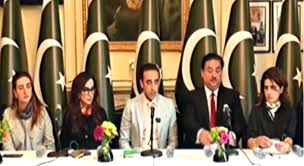India wants to ‘sabotage President Trump’s peace efforts’: Bilawal

Celina Ali
Islamabad: Former foreign minister Bilawal Bhutto-Zardari on Wednesday lambasted India for attempting to “sabotage President Donald Trump’s peace efforts” in South Asia, stressing that Pakistan was willing to solve all issues through dialogue.
His statement came against the backdrop of Pakistan’s recent conflict with India triggered by a deadly April 22 attack on tourists in Occupied Kashmir’s Pahalgam. New Delhi, without evidence, accused Islamabad of backing the attackers — an allegation that led to a four-day military escalation between the two nuclear-armed countries before the United States brokered a ceasefire on May 10.
To present Pakistan’s stance on the escalation and dismiss Indian propaganda, the government constituted a high-level delegation, chaired by Bilawal, to visit major world powers. After holding meetings in the US, the delegation is now in the United Kingdom, after which it will head to the Belgian capital of Brussels to hold talks with the members of the European Commission.
Addressing a press conference at the Pakistan High Commission in London, Bilawal said, “India wants to sabotage President Trump’s peace efforts, but its efforts will be in vain. The US will, if required, drag India to the table as it in the global interest that India and Pakistan make peace for regional stability and move towards development.”
The PPP chairman added that the recent conflict with India had turned the Kashmir dispute into a global issue despite New Delhi’s attempts to call it an “internal matter.”
“During this war, there has been progress regarding Kashmir on the diplomatic front. In 2019, India thought it had turned Kashmir into an internal matter. When Trump said there should be mediation on Kashmir, the issue is now a global issue. India has been forced to accept that Kashmir is a bilateral issue.”
A day earlier, the US Department of State reiterated President Trump’s resolve to work on the Kashmir dispute, saying each step that he takes “is made to solve generational differences between countries”.
Responding to a question on the steps US plans to take in the wake of Trump’s offer, State Department’s spokesperson Tammy Bruce during a press briefing noted, “So, while I can’t speak to his plans, the world knows his nature, and I can’t speak to any details of what he might have in that regard.”
He said the delegation held a meeting with members of the All Parties Kashmir Conference at the British House of Commons, who accepted that the issue has been globalised and they can speak about it.
Other members of the delegation include — Hina Rabbani Khar, Khurram Dastgir, Sherry Rehman, Musadik Malik, Faisal Sabzwari, Bushra Anjum Butt and senior envoys Jalil Abbas Jilani and Tehmina Janjua.
Bilawal reaffirmed that Pakistan desires peace but will defend itself from Indian aggression if attacked.
“Pakistan believes that through dialogue, all issues — whether Kashmir, water or terrorism — can be resolved. War is not the solution,” he asserted, adding the message would be conveyed to the European Commission during the visit to Brussels as well.
“India’s narrative is based on lies. Its war and post-war narrative is also based on lies. The people of India also want to live in peace.
“We have demonstrated that we can defeat India in conventional war as well as on the diplomatic front. We are talking about peace and India about war.”
Answering a question, Bilawal said India had no right to suspend or terminate the Indus Water Treaty — a deal between Pakistan and India that ensures fair distribution of the Indus River system’s waters. Following the Pehalgam attack, New Delhi held the treaty in abeyance.
“The treaty is still intact. India’s statement (on holding the treaty in abeyance) is a violation of the Indus Water Treaty. Even threating to suspend the treaty is a violation of the UN charter. If India suspends it, we have called it an act of war.”
The former minister said India would have to “take back the statement on holding the treaty in abeyance.”
“If we are to create an enabling environment for dialogue, it is necessary that treaties are upheld,” he said.
Bilawal also criticised the recent statement of Indian External Affairs Minister S Jaishankar on Pakistan, who said that when India’s Prime Minister Narendra Modi said that “Operation Sindoor” was not over, it was a clear message that India “reserved the right to go after terrorists anytime, anywhere if they have done harm to us”.
“Jaishankar is a war monger, not a diplomat. If he thinks threatening nuclear war is diplomacy, then India’s problem isn’t Pakistan, it’s extremism within its own cabinet,” Bilawal said.
“Pakistan rejects these recycled allegations. It is ironic that a country with a sitting prime minister whose reputation speaks for itself… dares to lecture Pakistan, who is a victim of terrorism. Threatening missile strikes and boasting about escalation is not a display of strength, it’s a dangerous sign of regional instability.”
“The world should ask who is the aggressor. Pakistan responded with restraint, India continues to brag about war. Even India’s military has walked back its initial lies. Pakistan air force defended its air space.”
“If Jaishankar is so enamored by Google images, I suggest he Googles Abhinandan,” he quipped, referring to the Indian Air Force fighter pilot Abhinandan Varthaman, who was captured on 27 February, 2019, after his plane was shot down inside Pakistani territory.
Bilawal said India has been unable to provide even a shred of evidence on the baseless allegations in the Pahalgam attack in occupied Kashmir in which 26 people lost their lives.
“Pakistan has asked for evidence. We have nothing to hide. If India has proof linking the April attacks to Pakistani soil, Pakistan group, then share with the international community.
“The truth is India knows Pakistan has nothing to do with the attacks. That is why India refused our prime minister’s call for an investigation. That is why to this day, they are hiding the truth from their citizens. This was an indigenous act of terrorism, an Indian intelligence failure, and the Indian government launched a war based on a lie,” he asserted.
The Bhutto scion said Pakistan will continue to peruse peace from “Kartarpur to the ceasefire”, while India continues to pursue “propaganda, polarisation, and war”.
“We want peace, stability and regional integration. All we see from New Delhi since election time is jingoism as a war policy,” he said.
In response to another question, Bilawal said India has targeted Sikh activists in Pakistan and countries around the world, and employing terrorism as a foreign policy that cannot be allowed for any civilised nation.
“I think India’s targeting campaign against Sikhs is a continuing factor why the world wasn’t with them when they raised allegations against Pakistan,” he said.
“The world knows India targeted Sikhs activists, killed them, or paid criminals gangs. India has targeted Sikhs in Pakistan also. Canada has said India paid criminal organisations to target Sikhs. There were also targeted in US and Australia.”





